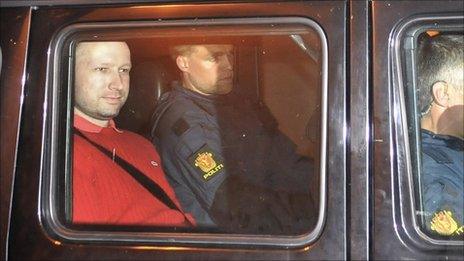Norway: Anders Behring Breivik claims 'two more cells'
- Published

Norwegian police are investigating claims by Anders Behring Breivik, who has admitted carrying out Friday's twin attacks in Norway, that he has "two more cells" working with him.
Mr Breivik made the claim at his first court hearing since the bombing in Oslo and massacre at an island youth camp.
Police have now revised down the island killings from 86 to 68 but increased the bomb death toll by one to eight.
At least 100,000 people have gathered in Oslo for a vigil for the victims.
Earlier on Monday, a minute's silence was held across the country.
Closed doors
Mr Breivik was remanded in custody for eight weeks.
Oslo police asked for Mr Breivik to be held in full isolation for the first four weeks.
Judge Kim Heger agreed, saying Mr Breivik could not receive letters or have visitors except for his lawyer.
Judge Heger said police must be able to proceed with the investigation into Mr Breivik's claims without the accused being able to interfere.
Mr Breivik had earlier said he had acted alone.
Prosecutor Christian Hatlo said police could not rule out that someone else was involved and confirmed an investigation was underway into Mr Breivik's claims that he had worked in a cell, or group, and that there were two other cells.
Mr Breivik has been charged under the criminal law for acts of terrorism. The charges include the destabilisation of vital functions of society, including government, and causing serious fear in the population.
The judge said that Mr Breivik had admitted carrying out the attacks but had not pleaded guilty to the charges.
Mr Hatlo said the accused was very calm at the hearing, appeared "unaffected" by the events, and was willing to explain his motives. He said Mr Breivik was allowed to do this to a certain extent by the judge, but when he started reading from his manifesto he was stopped.
Mr Hatlo also said that Mr Breivik expected to spend the rest of his life behind bars.
Norway's maximum prison sentence is 21 years, although those who continue to pose a danger to society can be detained longer.
The BBC's Jon Sopel has been granted the only British television interview with Norwegian Prime Minister Jens Stoltenberg
Two psychiatrists have been assigned to assess Mr Breivik's mental health.
Judge Heger had earlier ruled that the hearing should be held behind closed doors amid security concerns and fears that Mr Breivik would use it to deliver a speech seeking to justify his actions.
Instead Judge Heger summarised Mr Breivik's words in his post-hearing statement.
The judge said Mr Breivik had argued that he was acting to save Norway and Europe from "Marxist and Muslim colonisation".
The gunman had said his operation was not aimed at killing as many people as possible but that he wanted to create the greatest loss possible to Norway's governing Labour Party, which he accused of failing the country on immigration.
The bomb in Oslo targeted buildings connected to the Labour Party government, and the youth camp on Utoeya island was also run by the party.
In addition to those killed, at least 96 people were injured in the attacks.
Police officials defended their response to the attacks
Police on Monday revised down the number killed on Utoeya, citing difficulties in gathering information in the wake of the shootings.
But they said there was still no exact picture of how many died in the Oslo bombing.
Norway's secret service said authorities were alerted to Mr Breivik's name in March when he bought an undisclosed product from a Polish chemical firm.
But its head, Janne Kristiansen, said there had not been enough evidence to investigate further.
Political postponement
Separately, Norway's Prime Minister Jens Stoltenberg, in his first interview with a British broadcaster, told the BBC's Jon Sopel that the attacks would change his country but that it would "still be open and democratic".
Anders Breivik's father, Jens told Norway's TV2: ''What he ought to have done... was to have killed himself''
Mr Stoltenberg said he knew many of those who had died and now was the time to look after the wounded and the families that had lost loved ones.
He said he believed no country could ever fully protect itself from attacks such as these.
He also thanked the international community for its response.
Earlier at 1200 local time (1000 GMT), Mr Stoltenberg, at Oslo University, declared one minute's silence in remembrance of the victims.
Thousands of people stood around a carpet of flowers at Oslo cathedral.
One Oslo citizen, Sven-Erik Fredheim, told Reuters: "It is important to have this minute of silence so that all the victims and the parents of the families know that people are thinking about them."
In addition to Monday's Oslo vigil, gatherings are taking place in other towns and cities across Norway.
Meanwhile, Norway has postponed the start of party political campaigns ahead of the 12 September election, the Aftenposten newspaper reports.
The campaigning is now set to start during the second half of August.